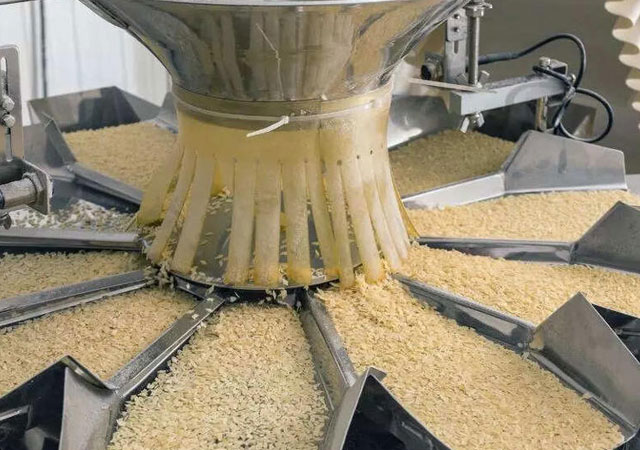 The Japanese government aims to lower rice prices by selling further supplies of stockpiled rice directly to retailers. The government's release of these supplies is being met with mixed feelings across Japan.
The Japanese government aims to lower rice prices by selling further supplies of stockpiled rice directly to retailers. The government's release of these supplies is being met with mixed feelings across Japan.
Japan to release more stockpiled rice
Japan's agriculture minister says the government plans to release more stockpiled rice to rein in soaring prices of the staple food.
Koizumi Shinjiro said on Tuesday the government will sell 200,000 tons harvested in 2020 and 2021 to retailers via no-bid contracts.
That follows 300,000 tons of stockpiled rice it already started selling under the same scheme.
The government's effort to bring down rice prices is slowly being felt.
The most recent data from the agriculture ministry shows that rice prices at supermarkets fell for the second straight week in late May although it didn't include rice released from national stockpiles sold under the new no-bid contract system.
The average price of a 5-kilogram bag, including tax, was 4,223 yen, or about 29 dollars, for the week through June 1st. That's down 0.9 percent from the previous week. The calculation is based on a survey of approximately 1,000 supermarkets nationwide.
Rice store: Wholesale prices have begun to change
The manager of a rice store in Fukuoka Prefecture says the price wholesalers suggested for some non-stockpiled rice last week was about 20 percent lower than in March.
Ishinuki Tetsuya says wholesalers might now be working to clear their inventories of rice harvested last year after government stockpile rice has been released to the market.
He said "I think more wholesalers now want to sell rice from the last harvest quickly because the new harvest will come soon."
Businesses wait for inexpensive rice
Businesses serving rice are looking forward to buying lower-priced products.
This Japanese-style pub in Osaka Prefecture is popular for its 500-yen, or 3.5-dollar, lunch with all-you-can-eat rice.
The pub bought stockpiled rice last week to maintain its low lunch price. The manager got in a line at a supermarket from early in the morning and bought two bags.
But the pub used up all the rice in about 4 days.
The manager said, " I thought of raising the price of lunch, temporarily, but I would like to keep it at this price for my customers. I hope the price of rice will go down further."
Farmers concerned about falling rice prices
Meanwhile, some people are paying close attention to the decline in rice prices.
Aoki Takuya is a farmer in Niigata Prefecture. He grows rice in these 40 hectares of rice paddies.
He sells the harvested rice to wholesalers. He plans to negotiate this year's rice price with them in late August, but he is concerned that the price may not be enough to cover production costs. He says that the costs involved in growing rice have risen year by year. He fears that consumers will become accustomed to the low price of stockpiled rice and want normal rice to be sold at lower prices as well.
He said, "Because it's stockpiled rice, I can understand that the government is selling it for 2,000 yen. Officials should emphasize it's from stockpiles. Farmers will not be able to make a living if their rice is sold at the same price level."
Sales of normal rice fall
Some retailers are also concerned.
A supermarket in Saitama Prefecture does not sell government stockpiled rice. Its sales have slowed down after the stockpiled rice was released on the market.
Rice sales in May were down by nearly 30 percent from April. In response to this, the shop has sold a limited amount of rice products at lower prices.
The store has now reduced its orders from three times a week, during busy periods, to just once a week.
Expert: "rice prices may come down slightly "
Mitsubishi Research Institute Research Fellow Inagaki Kimio says more businesses might want to lower their prices of expensive normal rice currently in stock when they see cheaper government-stockpiled rice continue to sell well.
The expert also points out that the key to whether rice prices will come down from now on is the price of this year's harvest. This price will depend on two important points.
One of these is the advance payments made to farmers.
Some prefectural bodies of the country's largest group of rice collectors and wholesalers, the Japan Agricultural Co-operatives, have already decided to significantly raise their advance payments to farmers. These payments are made every autumn when rice harvests are shipped and serve as a benchmark for setting the market price of rice products.
Inagaki says the higher advance payments would indicate rice prices may not come down.
The other point to consider is the size of this autumn's harvest.
The agriculture ministry expects that the amount of rice to be harvested this year will increase by 400,000 tons from last year.
This would suggest that prices of the staple grain might come down.
Inagaki says businesses might have to make a decision to lower the prices when they see abundant rice in the market and consumers are not satisfied with the prices.














© Copyright 2025 The SSResource Media.
All rights reserved.